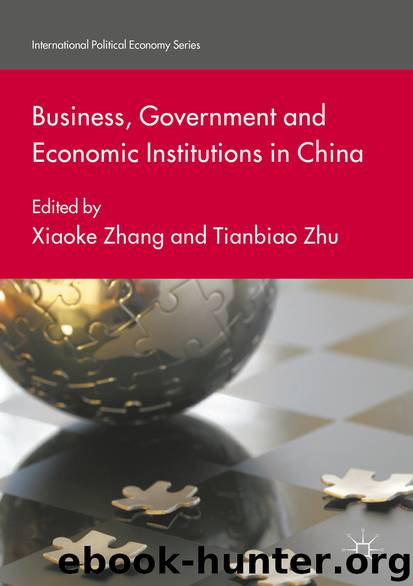Business, Government and Economic Institutions in China by Xiaoke Zhang & Tianbiao Zhu

Author:Xiaoke Zhang & Tianbiao Zhu
Language: eng
Format: epub
Publisher: Springer International Publishing, Cham
The Institutional Context: The Chinese Legislature
A large majority of authoritarian regimes , regardless of types (i.e. hegemonic/single party regimes, monarchies, and personalist regimes, or military regimes), have legislative institutions. Malesky and Schuler (2010) point out that in terms of nomination procedures, electoral competitiveness, and professionalism of these institutions, authoritarian regimes display significant variations. In some countries, such as Malaysia, elections for legislative seats can be quite competitive. The elected members of parliament in Malaysia are also more like professional legislators in western democracies, who meet on a regular basis. In contrast, the People’s Congress , the major legislature in China, is made up mainly of part-time delegates, who are elected through less contested elections and meet rarely each year (O’Brien 1994). For decades, the People’s Congresses were considered the “rubber stamp” of decisions made by the Chinese Communist Party (CCP) and the government. However, the Chinese legislature has played an increasingly active role in the past years with its expanded jurisdiction, capacity, and assertiveness (Manion 2008).
The People’s Congresses in China, following the party and government hierarchies, exist at every administrative level, from the central, to provincial, prefectural, to county and township levels. At the central level, as stipulated by the Chinese Constitution, the National People’s Congress (NPC) is considered the highest organ of state power in China. Theoretically, like the parliament in democracies, the NPC enacts laws, makes policies, and elects top government officials of the central government . LPCs emulate the NPC , electing chief officials at their respective administrative levels, drafting and approving local laws and policies. They even have the power to impeach government officials if necessary.
Recent research shows that LPCs are more energetic than commonly thought and are closer to the local power center than the NPC (Cho 2009; Xia 2007). Along with the administrative reform, the LPCs have emerged as partners in governance providing a new arena for interested parties to work out differences. Responding to the principle of “lawmaking in advance”, LPCs actively step into areas not legislated by the central government , making local statutes and creating test points. Most of the locally made laws concern the economy, especially market creation, such as promoting private enterprises, restructuring state sectors, and regulating the stock market. Moreover, local lawmaking has become a more pluralized policy process in which the originally strong impact of the party committees and government departments has increasingly been limited and indirect, and multiple players have opportunities to provide policy inputs (O’Brien 2009).
In addition to a stronger capacity of lawmaking, LPCs also strengthened their oversight of government performance through organized inspection tours, appraisal of local officials ’ work, approval of local leaders, and examination of work reports of the government. For instance, the LPCs once vetoed a court work report in Shenyang , and refused to ratify the appointment of several bureau directors in Guangdong (Cho 2009, p. 1–2). These striking cases are probably unable to represent the common practices across the country, but they do show the rising assertiveness of LPCs in China.
Download
This site does not store any files on its server. We only index and link to content provided by other sites. Please contact the content providers to delete copyright contents if any and email us, we'll remove relevant links or contents immediately.
International Integration of the Brazilian Economy by Elias C. Grivoyannis(110203)
The Radium Girls by Kate Moore(12018)
Turbulence by E. J. Noyes(8040)
Nudge - Improving Decisions about Health, Wealth, and Happiness by Thaler Sunstein(7693)
The Black Swan by Nassim Nicholas Taleb(7109)
Rich Dad Poor Dad by Robert T. Kiyosaki(6612)
Pioneering Portfolio Management by David F. Swensen(6289)
Man-made Catastrophes and Risk Information Concealment by Dmitry Chernov & Didier Sornette(6007)
Zero to One by Peter Thiel(5787)
Secrecy World by Jake Bernstein(4741)
Millionaire: The Philanderer, Gambler, and Duelist Who Invented Modern Finance by Janet Gleeson(4468)
The Age of Surveillance Capitalism by Shoshana Zuboff(4277)
Skin in the Game by Nassim Nicholas Taleb(4239)
The Money Culture by Michael Lewis(4198)
Bullshit Jobs by David Graeber(4179)
Skin in the Game: Hidden Asymmetries in Daily Life by Nassim Nicholas Taleb(3991)
The Dhandho Investor by Mohnish Pabrai(3759)
The Wisdom of Finance by Mihir Desai(3735)
Blockchain Basics by Daniel Drescher(3574)
